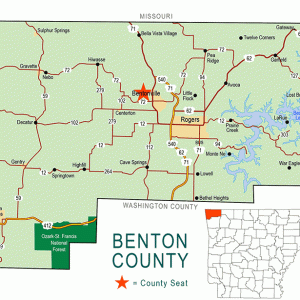calsfoundation@cals.org
Avoca (Benton County)
| Latitude and Longitude: | 36°24’07″N 094°04’15″W |
| Elevation: | 1,362 feet |
| Area: | 1.87 square miles (2020 Census) |
| Population: | 487 (2020 Census) |
| Incorporation Date: | March 16, 1966 |
Historical Population as per the U.S. Census:
|
1810 |
1820 |
1830 |
1840 |
1850 |
1860 |
1870 |
1880 |
1890 |
1900 |
|
– |
– |
– |
– |
– |
– |
– |
– |
– |
– |
|
1910 |
1920 |
1930 |
1940 |
1950 |
1960 |
1970 |
1980 |
1990 |
2000 |
|
– |
– |
– |
– |
– |
– |
173 |
256 |
269 |
423 |
|
2010 |
2020 |
|
|
|
|
|
|
|
|
|
488 |
487 |
|
|
|
|
|
|
|
|
Avoca is a town on U.S. Highway 62 in Benton County, located between Rogers (Benton County) and Pea Ridge National Military Park. Since its incorporation in 1966, it has benefited from the general growth in population that northwestern Arkansas has experienced.
In the early years of the Arkansas Territory, the Osage were frequent visitors to the forested hills of northwestern Arkansas. Three treaties moved the Osage farther west, and the area began to be developed for white settlement as Lovely County. Later, the region was renamed Washington County, and in 1836—the year Arkansas became a state—Benton County was separated from Washington County. Settlement remained sparse in the Avoca area, however, until after the Civil War. The Butterfield Overland Mail Company passed through the area on its way to its first stop in Arkansas, which was at Callahan’s Station, near what is now Rogers.
During the Civil War, the Action at Pott’s Hill was fought on February 16, 1862, on Dunagin’s farm near where Avoca now stands. The action was an important predecessor to the Battle of Pea Ridge, fought in March of the same year. After that battle, the area remained firmly in Federal control until the end of the war.
A stagecoach road was established after the war that ran through Benton County. The route included a stop in a valley, where Brightwater (also called Bestwater) would be established. Albert Peel opened a store at the stagecoach stop and named the place Avoca, probably for the river and town on the eastern coast of Ireland. Historian J. Dickson Black claims that the names Avoca and Brightwater were suggested by Albert’s wife, Mary Kate Anderson Peel.
A post office was established at Avoca in 1872. In 1881, as the St. Louis–San Francisco Railway (the Frisco) was being built, railroad engineers chose to avoid stopping and starting in the valley. Peel platted a town next to the railroad, moving his store and post office to a new higher location, which kept the name Avoca. By 1888, the settlement contained a railroad depot, two general stores, a blacksmith shop, a grain warehouse, and a school. The apple industry was then thriving in Benton County, and Avoca had two or three apple evaporators as well as a large stockyard by 1900. The depot was considered one of the more important commercial stops in the county.
A new school was built around 1912. By that year, Avoca had three general stores, a drugstore, a cooperage house where barrels were constructed, a vinegar plant, and a lime plant. Two canning factories were later opened in the community. The apple crop of the region began to fail, though, and Avoca was eclipsed by Rogers to the south. Avoca schools were consolidated with Rogers in 1929, although grades one through six continued to be taught in Avoca until the end of the 1940s.
In 1934, a paved road that would be U.S. Highway 62 was built just west of the rail line. The few Avoca businesses that had survived the onset of the Depression relocated along the busy highway. More houses were built west of the highway in a section that became known as the Peel Addition. Construction of a dam on the White River in Carroll County began in 1960, creating a reservoir called Beaver Lake, which extends into Benton County and draws tourists into the Rogers and Avoca area.
By the mid-1960s, it appeared that Avoca, like so many other small communities in Arkansas, was about to fade away. To reverse that trend, residents voted to incorporate as a town. That same year, a gravel pit owned by McClinton-Anchor Construction Company opened east of Avoca, providing jobs to people in the area. Development of corporations such as Walmart Inc. and Tyson Foods brought many new people to the area. While Rogers grew dramatically at the end of the twentieth century, Avoca also attracted new residents who preferred life in a smaller town.
In the twenty-first century, Avoca has more than thirty businesses, including stores, automotive businesses, an antiques shop, and the quarry. There are three churches in Avoca: a Baptist church, a Christian church, and a Kingdom Hall of the Jehovah’s Witnesses. The 2010 census recorded 488 residents of Avoca, most of them white, with eighty-five identified as Hispanic. The town of Avoca hosts a community picnic every September.
Avoca was the childhood home of poet Edsel Ford.
For additional information:
Avoca, Arkansas. https://www.avocaarkansas.info/ (accessed November 19, 2025).
Benton County Heritage Committee. History of Benton County, Arkansas. Rogers, AR: Benton County Heritage Committee, 1991.
Black, J. Dickson. History of Benton County. Little Rock: International Graphics Institute, 1975.
Steven Teske
Butler Center for Arkansas Studies






Comments
No comments on this entry yet.